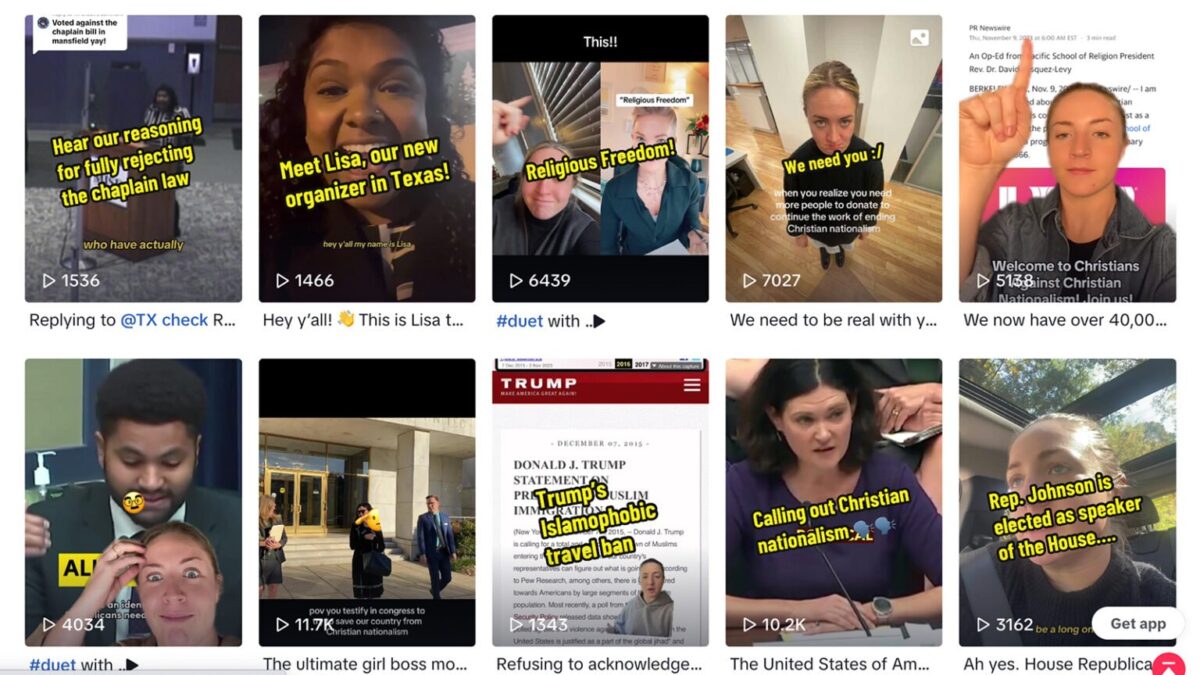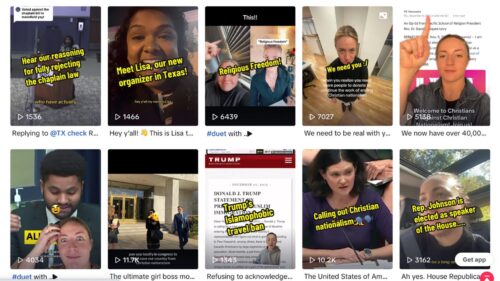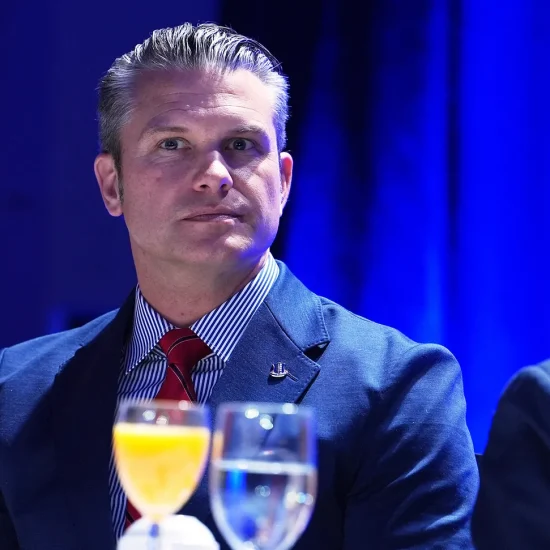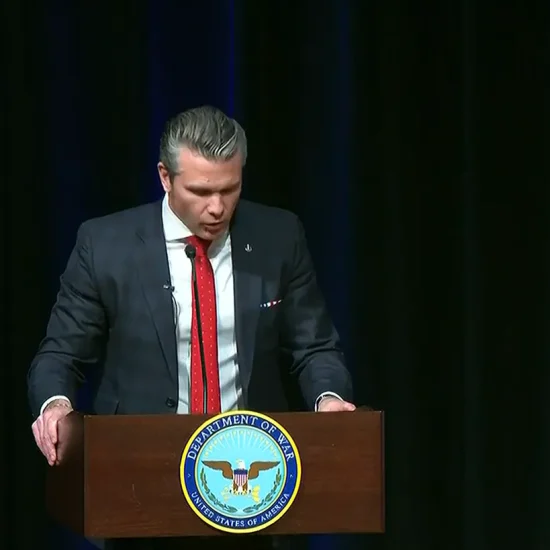
(RNS) — Standing outside the U.S. Capitol on Jan. 6, 2023, Georgia McKee witnessed two very different responses on the second anniversary of the infamous mob attack.
Circled together and holding candles, one group of faith leaders condemned Christian Nationalism, calling it a “poisonous ideology” and “gross distortion of our Christian faith.”
The other group marched in front of the Supreme Court building, shouting into megaphones, wearing MAGA hats, waving American flags, and holding signs saying, “One Nation Under God.”
McKee took some videos on her phone, spliced them together to contrast the two gatherings, and showed the final video to her co-workers at the Baptist Joint Committee for Religious Liberty, a coalition of Baptist denominations that advocates for the separation of church and state. Next, she created a TikTok account and posted the video. In the year since it’s had over half a million views.
“That made us realize, oh, people like this content,” said McKee, digital communications associate at BJC. “We got lots of messages saying, thank you so much for showing this video, we need more of a Christian witness that is faithful to the message of Jesus.”
@endchristiannationalism Happening now in front of the Capitol, 2 years post January 6 insurrection. #christiannationalism #seperationofchurchandstate #january6 #jan6thinsurrection #washingtondc #prayervigil
The @EndChristianNationalism TikTok account has gained more than 40,000 followers and earned over 600,000 likes in the past year. The account is affiliated with BJC’s Christians Against Christian Nationalism campaign, a grassroots movement that provides training and resources for combating Christian Nationalism on the ground.
“It’s not just about going viral for us,” said McKee, who runs the account.
Raised in Texas, McKee grew up attending a Southern Baptist church where an American flag flanking the pulpit was commonplace. But in college at Belmont University in Nashville, Tennessee, McKee began to reckon with what she saw as exclusionary elements of her faith. She deconstructed, became spiritual but not religious, and then joined an Episcopal church for a season. Today, McKee is a seminarian at Wake Forest University School of Divinity, where she’s studying to become a Baptist minister in a more progressive Baptist tradition, like Cooperative Baptist Fellowship and Alliance of Baptists, “or whatever comes next,” she told Religion News Service.
After a year of making videos where she leans into her now-trademark tiny clip-on mic and gives play-by-plays of Christian Nationalism in action, McKee can spout off a definition for the topic without hesitation.
“Christian Nationalism is a political ideology and cultural framework that abuses the name of Jesus for a very specific American goal,” McKee said. “Christian Nationalism is not Christianity.”
Many of her TikToks are intended to educate viewers on the topic. She’ll highlight the Christian Nationalism of figures such as Sean Feucht, Lauren Boebert, and Marjorie Taylor Greene while also celebrating Christians, such as Shane Claiborne and BJC Executive Director Amanda Tyler, who oppose the ideology. McKee also uses the platform to connect people to resources for addressing Christian Nationalism in churches and in local politics.

TikTok videos from the @EndChristianNationalism account. (Screen grab)
“We’ve really seen the impact of online to offline organizing with TikTok,” said McKee. “We multiple times have helped people develop their public comment that they’re going to go and share that evening at their local school board or city council meeting.”
After stumbling across the @EndChristianNationalism account, Megan Fanning, who lives in Mansfield, Texas, began connecting with McKee this spring after Texas lawmakers passed a bill allowing chaplains in public schools.
“We’ve communicated about the chaplain policy ever since the bill was signed, because the school boards had six months to vote for or against it,” said Fanning. “She offered resources, a chaplain toolkit, fact sheets, educational PDFs.”
The resources led Fanning to email her school board members referencing facts and information provided in the Christians Against Christian Nationalism toolkit. Christians Against Christian Nationalism also hired its first field organizer, Lisa Jacob, to lead opposition to Christian Nationalism in North Texas. Jacob delivered a rousing public comment condemning the chaplain bill at a Mansfield school board meeting in December, shortly before the board voted against implementing the chaplaincy bill in the school district.
“To have a field organizer from Christians Against Christian Nationalism come and speak at our school board meeting on behalf of our community against this chaplain policy meant so much,” said Fanning. “I like to think that community feedback might have made a difference in them voting against and rejecting the policy.”
“We’re seeing that even in the evangelical camp, even conservative Christians that I might not agree with on any other topic, are able to still say Christian Nationalism is a topic that has to be talked about, that it has to be something that’s combated in all local churches, not just progressive churches,” said McKee. “Fighting Christian Nationalism, for it to truly end, it cannot be a progressive issue. It has to be a Christian issue.”
@endchristiannationalism Thank you to everyone who made this happen!!! #christiannationalism #reawakenamerica
In addition to attracting a range of Christians, and even many non-Christians, the account engages people of a variety of ages, especially millennials in their 30s and 40s. According to McKee, having a space explicitly dedicated to opposing Christian Nationalism on TikTok is crucial, especially given the influence of conservative Christian celebrities such as Allie Beth Stuckey and Sadie Robertson Huff, who, McKee said, have been influenced by Christian Nationalism.
“We’re seeing like this old school fundamentalism almost become trendy and cute,” said McKee.
Tim Whitaker, creator of the nonprofit The New Evangelicals who runs the organization’s hugely popular TikTok account, said part of @EndChristianNationalism’s success on the platform can be attributed to its focus on giving people verifiable facts.
“What I like about their account is that they’re giving a lot of just data. You know, hey, here’s what this person said, here’s what this person did,” said Whitaker. Simply reporting instances of Christian Nationalism, he added, is critical at a time when the average American is likely unaware of the extent to which Christian Nationalism is fueling national politics.
“I think it’s really important going into 2024 more than ever, that there are Christians who are loud about resisting such an ideology and movement for the sake of all their neighbors,” said Whitaker.
(This story was reported with support from the Stiefel Freethought Foundation.)






